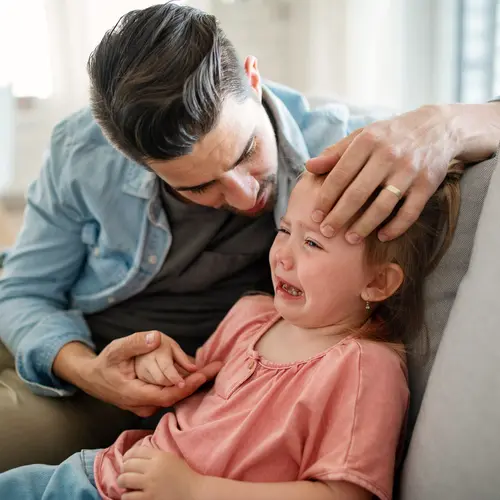Steve and Laura thought the kids were asleep. He'd been away on a business trip and they were eager to be together. Too eager, perhaps -- they'd failed to lock their bedroom door. As it turned out, 8-year-old James hadn't had enough time with Daddy, either. Hoping to crawl into bed for some extra snuggles, he walked in without knocking.
Standing in the doorway for three long seconds ("one one thousand, two one thousand, three one thousand"), James saw things he'd never seen his parents doing before, until Steve and Laura realized he was there. How did he -- and they -- handle it?
The answer largely hinged on one thing: how much accurate and age-appropriate information Steve and Laura had already shared with James. If a child has had many small, casual conversations about sexuality with his or her parents starting as soon as language begins, then the reaction isn't likely to be a negative one.
So, while I always advise parents to check that they've locked their bedroom door (and install a lock if one is missing), I also tell them not to be devastated by a surprise visit. There is no harm in children understanding that parents share a special way of being physically intimate with each another. (In fact, it's very healthy.) Such an experience may be embarrassing, but the best approach is to remain calm and matter-of-fact. Parents can say, "We are having some private time together and we would like you to leave the room. Please be sure to close the door."
Parents should also go to the child to ask what he saw -- or thought he saw -- and to invite questions or offer reassurance about what has happened. A 3-year-old might wonder if anyone was being hurt (based on the sounds and actions), so it's a good idea to reassure him. A 5-year-old is likely to be quite the scientist and try to get as close as possible -- while going undiscovered -- to figure out exactly what is happening. (Offer some information to "the scientist" and this should suffice.) An 8-year-old may have hit the "cooties" stage and think that it's weird that anyone would ever want to do that. A 12-year-old is likely to be "grossed out" and turn on his heel because his parents were having sex!
Parents who get caught fooling around need to understand that kids process information about sex -- everything from what their friends discuss with them to what their parents do -- gradually and incrementally. That means if a child like James happens to see his parents, he's likely to feel some surprise. But not as much if he or she already knows that his parents sometimes express their care for each other by kissing and rubbing their bodies and genitals together while naked in bed. Offer your children a constant stream of sexual information, and if they happen to see you in the act, the dreaded "primal scene" need not be so upsetting.
Originally published in the January/February issue of WebMD the Magazine.


